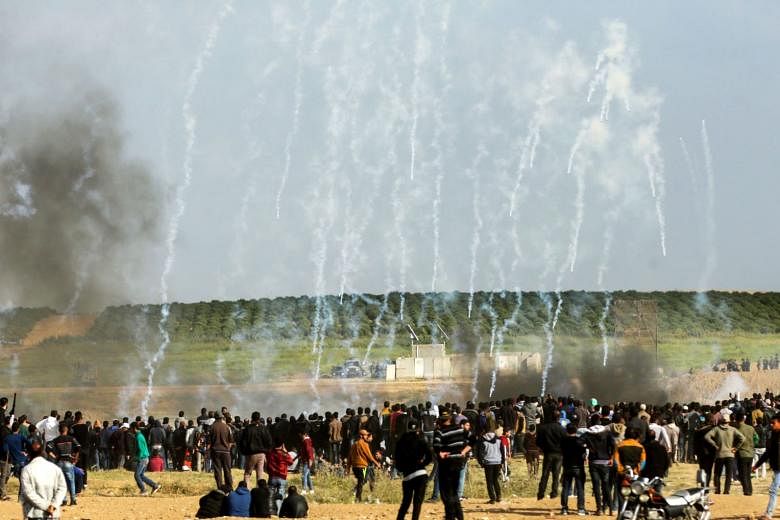GAZA CITY, PALESTINIAN TERRITORIES (REUTERS, AGENCE FRANCE-PRESSE) - Israeli troops fired warning shots towards Palestinian youths gathered at the Gaza-Israel border on Saturday, wounding 13 people, a day after deadly violence broke out in one of the biggest Palestinian demonstrations there in years.
Tens of thousands of Palestinians had gathered on Friday along the fenced 65km frontier, where tents were erected for a planned six-week protest pressing for a right of return for refugees and their descendents to what is now Israel.
At least 15 Palestinians were killed by Israeli security forces confronting protesters, some of whom the military said had opened fire, rolled burning tyres and hurled rocks and fire bombs towards troops across the border.
The Gaza Health Ministry had said on Friday 16 people were killed but revised the death toll to 15 yesterday.
Thousands attended funerals for 14 of those killed with mourners holding Palestinian flags and some chanting "revenge" and firing into the air.
The armed wing of Hamas, the Islamist movement that runs the Gaza Strip, said that five of those killed were members who were participating "in popular events side-by-side with their people."
"Where are you, Arabs? Where are you, Muslims?" mourners chanted at one funeral, calling on the Arab and Muslim world to intervene.
A general strike was also being held in both the Gaza Strip and the occupied West Bank.
Minor clashes between Israeli forces and Palestinians broke out in Hebron, while a small protest was held in Nablus, both in the West Bank.
Israel defended its soldiers' actions on Friday, when troops opened fire on Palestinians who strayed from the main tent city protest - attended by tens of thousands - and approached the heavily fortified fence cutting off the Gaza Strip.
An Israeli military spokesman said Friday's events were "not a protest demonstration" but "organised terrorist activity" by Hamas, which has fought three wars with Israel since 2008.
"If it continues, we shall have no choice but to respond inside the Gaza Strip against terrorist targets which we understand to be behind these events," Brigadier General Ronen Manelis told journalists.
Palestinians accused Israel of using disproportionate force, while human rights groups questioned Israel's use of live fire.
Unverified videos were being shared online, including one appearing to show a protester being shot while running with a tyre.
UN chief Antonio Guterres called for an "independent and transparent investigation". Israel's arch-foe Iran, a longstanding supporters of Hamas, condemned the "shameful" killings.
In addition to those killed, more than 1,400 were wounded, 758 of them by live fire, with the remainder hurt by rubber bullets and tear gas inhalation, according to the Gazan health ministry.
No casualties were reported among Israelis.
Palestinian president Mahmud Abbas declared yesterday a day of national mourning and in a speech said he held Israel fully responsible for the deaths.
His spokesman called on the United States at the UN Security Council to not provide "cover for Israel to continue its aggression against the Palestinian people".
The six-week protest is in support of Palestinian refugees and the timetable holds significance for a range of reasons that have added to tensions.
It began on Land Day, when Palestinians commemorate the killing of six unarmed Arab protesters in Israel in 1976, and as Jewish Israelis readied to observe the Passover holiday.
Protests will continue until the US opens its new Jerusalem embassy around May 14, a move that has provoked deep anger among the Palestinians, who see the city's annexed eastern sector as the capital of their future state.
May 14 will also mark 70 years since the creation of Israel, while Palestinians will mark what they call the Nakba, or "catastrophe," the following day.
Ramadan, the Muslim holy fasting month that often sees a surge in Palestinian attacks, also begins May 15.

